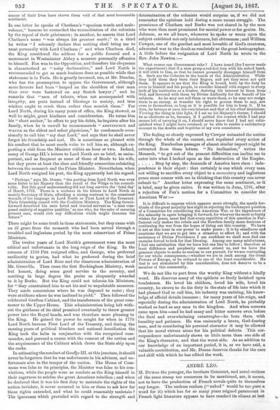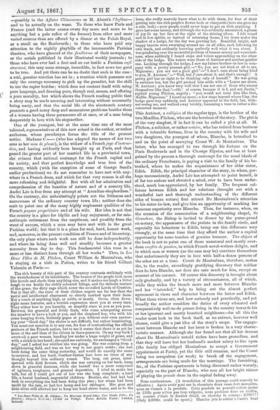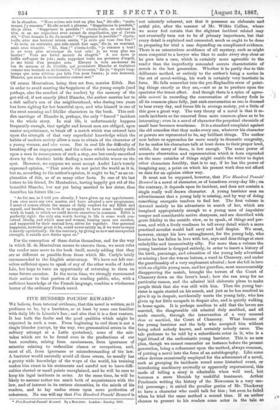ANDRE LEO.
M. Dumas the younger, the brothers Goncourt, and novel-writers of the same stamp too nwnerous to be mentioned, are, it seems, not to have the production of French novels quite to themselves any longer. The undress realism (" naked" would be too pure a word for it) which has for so many years reigned paramount in French light literature appears to have reached its climax at last
—possibly in the Affaire Clemenceau or M. Abont's
and to be actually on the wane. To those who know Paris and France (aud the latter ceases every day more and more to be anything but a pale reflex of the former) from other and more varied sources than are offered by a dinner at the Pelais Royal, or a stroll on the Boulevards ; to those who have paid any attention to the nightly playbills of the innumerable Parisian
theatres, who have glanced at the feuilletons of their newspapers, or the serials published in their illustrated weekly journals ; to those who have ever had a foot and an ear inside a Parisian café chantant, this may seem strange, incredible, in fact news too good to be true. And yet there can be no doubt that such is the case : a real, genuine reaction has set in ; a reaction which possesses not only the courage necessary to pick up the gauntlet, but the skill
to use the rapier besides ; which does not content itself with using pure language, and drawing pure, though real, scenes, and offering a pure morality, but which shows the French reading public that a story may be made amusing and interesting without necessarily being nasty, and that the social life of the nineteenth century presents a good many deep and momentous problems besides those of a woman having three paramours all at once, or of a man being desperately in love with his stepmother.
One of the youngest, but at the same time one of the most talented,zepresentatives of this new school is the author, or rather authoress, whose pseudonym forms the title of the present notice. Madame C— (who has adopted the names of her two
sons as her nom de plume), is the widow of a French juge d'instruc- lion, and having evidently been brought up at Paris, and then puled the greater part of her married life in a provincial town,
she evinces that rational contempt for the French capital and its society, and that perfect knowledge and true love of the country, which (with the exception of some of George Sand's earlier productions) we do not remember to have met with any- where in a French dress, and which for that very reason is all the more refreshing and delightful. But with all her admiration and comprehension of the beauties of nature and of a country life, Andre Leo is free from any attempt at " Arcadian-shepherdism." On the contrary, she unhesitatingly points out the littleness and narrowness of the ordinary country town life ; neither does she
emit to paint one of the many highly unpleasant qualities of the French paysan proprietaire and of his wife. Her idea is not that•
the country is a place for idyllic and lazy enjoyment, or for mis- anthropic retirement from the emptiness, and possibly from the want of success, which a man may have met with in the great
Parisian world ; but that it is a place for real, hard, honest work, and, moreover, in the present condition of France and of its society, the only place where such work can still be done independently, and where its being- done well and steadily becomes a greater necessity from day to day. This fundamental idea runs in a more or less distinct form through all her works.* Thus, in Les Deux Filles de M. Pliclwn, Count William de Montsalvan, who is staying on a visit in Poitou, writes to his friend Gilbert Valencin at Paris :— The rich beauty of this part of the country contrasts strikingly with the wretchedness of its inhabitants. The houses of the people look more like hovels and sheds than anything else, and it makes me laugh a bitter laugh to see beside the richly coloured foliage, and the delicate texture of the grass, the dirty rags which cover the so-called Lords of Creation. Nor is that all : the state of their clothes augers me far less than the moral and intellectual abasement so clearly marked upon their faces. Not a touch of anything high, or noble, or manly. Gross, often down- right mean features, and a brutish expression meet you at every turn. They either bow to you humbly, or stupidly stare at you as you pass. Between the graceful and lively foals, who come scampering across the meadow to have a look at you, and the shepherd boy, who with his arms hanging down, listlessly gapes at you, without ever even answer- ing your "Good-day," the choice is not difficult, bat rather humiliating. You must not mention it to any one, for fear of contradicting the official praisers of the French nation, but to me it seems that there is as yet far more of the serf than of the citizen in these peasants. On my way back I overtook a poor woman, bending low under a huge weight of grass, and with a sickle in her hand ; she eyed me curiously, we exchanged a "Good- day," and I asked her whither she was going. She was coming from a neighbouring field, and was on her way to her goat's stable ; she had been doing the same thing yesterday, and would do exactly the same to-morrow, and her hard, weather-beaten face bore no trace of any thought beyond this ordinary round. The long, cut grass, inter- spersed with field flowers, which she was carrying on her back, hung down in graceful festoons, while she herself was a mere compound of ugliness, roughness, and general depression. I tried to make her talk, but all I could got out of her was one long complaint: • a hard life, a brutal husband, ungrateful children. Besides, she had had bad luck in everything she had been doing this year ; her wheat had been spoilt by the rain, so had her hemp and her cabbages. Her goat and hens alone still allowed her to keep her head above water, and as to the * Les Deur Fides de M. Plishon ; Un Manage Scand deur; Use Vieille Me; Un Dirorce ; Jacques G.a, on ; 1 Ideal au Village. Paris, Achille Faure ; Loudon, Bolaudi. hens, she really scarcely knew what to do with them, for fear of their getting into the rich people's flower-beds or vineyards (here she gave D13 a side look)—poor people could never hope to get on with anything. I gave her some money, and although she was evidently astonished, a gleam of joy lit up her face at the sight of the shining silver. I felt vexed and in low spirits, so instead of returning home, I lay down under tho shadow of a hedge, for the day was growing hot. Beautiful, bright, and happy insects were swarming around me on all sides, each following its own track, and evidently knowing perfectly well what it was about. I was pondering over the mournful problem of human misery and wretched- ness, when suddenly I heard steps and voices approaching on the other side of the hedge. The voices were those of Anterior and another gentler one. Looking through the hedge, I saw my future brother-in-law in com- pany with a pretty peasant girl.—" No, you are not kind at all to me, Mignonne ; you are not a good girl."—" I don't care about being kind to you, M. Antener."—" Well, but /care about it, and that's enough ! A pretty girl has no right to be thinking only of herself." He was going to embrace her, but the girl pushed him aside with a "Leave me alone, M. Antenor ; you know very well that I am not one of those who amuse themselves like that."—Oh ! of course, because it is I, and not Justin," replied young Plichon angrily ; "you would not treat him like that, Madlle. Mignon:ie." I heard no more ; a few stops beyond whore I lay, the hedge gave way suddenly, and Antdnor appeared in the field, but, with- out seeing me, and walked away briskly, humming a tune in rather a dis- concerted manner.
This Antenor, a collegien of the regular type, is the brother of the two Mesdiles. Plichon, who are the heroines of the story. The plot is of the very simplest, if in fact it can be called a plot at all. M.
Plichon, a solicitor, or rather notaire, who has retired from business with a tolerable fortune, lives in the country with his wife and two daughters, the youngest of whom, Blanche, is betrothed to and on the point of marrying Count W. de Montsalvan. The latter, who has managed to run through his fortune on the Paris Boulevards and in the Champs Elysdes, and has at least gained by the process a thorough contempt for the usual ideals of the ordinary Frenchman, is paying a visit to the family of his be- trothed, where he makes the acquaintance of her elder sister, Edith. Edith, the principal character of the story, in whom, per- haps unconsciously, Andre Leo has attempted to paint herself, is of far too serious and elevated a mind, ever to have been under- stood, much less appreciated, by her family. The frequent col- lisions between Edith and her relations (brought out with a wonderful tact and thorough understanding of the different
sides of human nature) first attract De Montsalvan's attention to his sister-in-law, and give him an opportunity of marking her immense superiority over Blanche. Thus, for instance, when, on the occasion of the consecration of a neighbouring chapel, Sa Grandeur, the Bishop is invited to dinner by the purse-proud ex-notary, the appearance of the prelate in the family circle, and especially his behaviour to Edith, bring out this difference very
strongly, at the same time that they afford the author a capital opportunity for some touches of genuine humour. The object of
the book is not to paint one of those unnatural and mostly over- done conflits de passion, in which French novel-writers delight, and
in which men or women (as the case may be) convince themselves that unfortunately they are in love with half-a-dozen persons of the other sex at a time. Count de Moutsalvan, therefore, makes the, to the reader, exceedingly gratifying discovery that neither does he love Blanche, nor does she care much for him, except on account of his coronet. Of course this discovery is brought about only gradually, and by a variety of circumstances, all of which, while they widen the breach more and more between Blanche and her "intended," help to bring out the almost perfect agreement in views and character between the latter and Edith. What these views are, and how seriously and practically, and yet broadly the author considers the duties of every educated and comparatively well-to-do person living in the country towards his or her ignorant and mostly besotted neighbours—for all this the reader must look to the book itself, as no extract, however well chosen, could give a just idea of the story's scope. The engage- ment between Blanche and her lover is broken in a very charac- teristic manner. Although she has found out that all her dreams about De Montsalvan's untold riches have been groundless, and that they will have but her husband's modest salary to live upon (the family has - obliged Montsalvan to accept a Goverument appointment at Paris), yet the title still remains, aud the Count being too scrupulous (or weak) to break off the engagement, arrangements are being made for the marriage. The furnishing,
&c., of the Parisian apartments is being discussed rather warmly, especially on the part of B!anche, who sees all her bright visions of playing the grande dame in the capital fading away.
Nous continuiimes. (A translation of this passage could scarcely be effective.) Apres avoir pose our la cheminee deux vases fort mesquins, nous en vinmes It la pendule. Cette pendule no pouvait conter mein de 150fr. pour n'etre pas trop vulgaire, nous posdmes done ce cbiffre, et, comma c'etait le dernier detail, on chercha Is somme : 3,900! ! ! (Only 3,000fr. could be spent.) Blanche jets le cahior It l'autre bout
do la obambre. "Nous nylons mis tont an pins bas," dit-ells; "main- tenant, j'y renonce." Et elle se mit to pleurer. "Supprimons Is pendule," dis-je alors. 'Supprimer In pendule !" s'ecria-t-elle, en relevant Is tote, et on me regardant avec autant de stupefaction, quo si j'avais dit, " C'est domain In fin du monde." " Supprimer Is pendule !" repeta- t-elle, avec nue horreur mieux sentie, " je crois quo Tons etas fon I " " Je crois, an contraire, qua cola sernit fort sage," dis-je, en souriant. mais avec tbnacite. " Eb, bien !" s'ecria-t-elle, " je renonce a tout! je ne vonx plus mroccuper de tout cola! je no veax plus me warier ! Vous me feriez mourir do chagrin." A ces mots je faillis suffoquer de joie ; male, rappelant tonte ma presence d'esprits je me hiltai d'en prendre note. Elevant la voix an-dessus du ton de maman et de Olotilde, qui grondaient Blanche et traitaient commo une bontade sa dezlaration, "J'ai reconnu," dis-je, " depuis long- temps quo nous n'dtions pas faits l'an pour l'autre ; je suis heureux, Blanche, quo nous le reconnaissiez comme mob."
Of course Montsalvan, being thus set free, marries Edith. But in order to avoid marring thetappiness of the young couple (and perhaps, also the comfort of the reader) by the memory of the got-rid-of, if not exactly jilted Blanche, the author marries her to a rich miller's son of the neighbourhood, who daring two years has been sighing for her beautiful eyes, and who himself is one of the most amusing and lifelike characters in the book. This sud- den marriage of Blanche is, perhaps, the only " forced " incident in the whole story. In real life, it unfortunately happens frequently enough, that upright and honest men are obliged, upon nearer acquaintance, to break off a match which was entered into upon the strength of that very superficial knowledge which the habits of modern society allow a man to obtain of the character of a young woman, and vice versa. But in real life the difficulty of breaking off an engagement, and the odium which invariably falls upon a man in consequence of such a step, are but rarely smoothed down by the desolate bride finding a more suitable wooer on the spot. However, we suppose we must accept Andre Lio's tersely expressed opinion, "That novels do not paint the world as it is, but as, according to the author's opinion, it ought to be," as an ex- planation of this, as of so many other facts. In one of his last letters to his friend, De Montsalvan, having happily got rid of the beautiful Blanche, but not yet being married to her sister, thus describes his future life :—
" As for.me, as I told you already, I have given up my appointment. I am once more my own master, and have adopted a new programme. I must of course obtain the means of daily comfort for my Edith and myself, and besides, we both of us require to have some really useful work in hand, to which we could devote ourselves in common. Edith is perfectly right: the only aim worth having in life is some work con- ceived ideally, and which man and woman, leaning upon one another, and supported by their mutual love, strive for together. Our personal happiness, however great it be, could never satisfy us, if we were to enjoy it merely egotistically. On the contrary, by giving us new and unexpected strength, it entails new duties upon us."
For the conception of these duties themselves, and for the way in which M. de Montsalvan means to execute them, we must refer the reader once more to the book itself, merely adding that they are as different as possible from those which Mr. Carlyle lately recommended to the English aristocracy. We have not left our- selves sufficient space to speak of any of the other works of Andre Leo, but hope to have an opportunity of returning to them on some future occasion. In the mean time, we strongly recommend their author to that portion of the reading public, who, with a sufficient knowledge of the French language, combine a wholesome horror of the ordinary French novel.
































 Previous page
Previous page